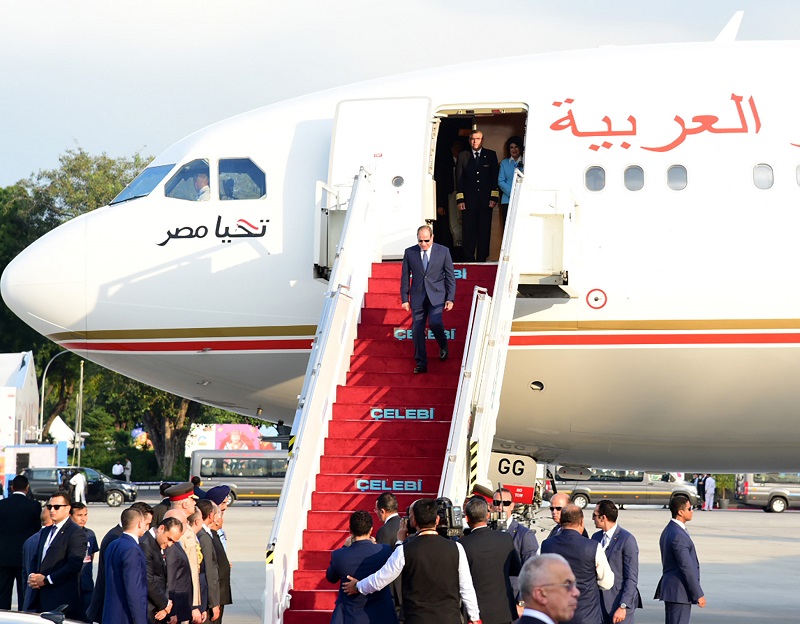

Egyptian President Abdel Fattah El-Sisi arriving in New Delhi on Friday (Image courtesy: PIB)
India, having worked extensively to ensure that people of Global South are no longer excluded from the fruits of development during its ongoing G20 Presidency, declared Friday that the G20 New Delhi Leaders’ Declaration on Sunday will be one of the strongest documents to voice their concerns.
“The New Delhi Leaders’ Declaration that you will see post the Summit, you will see it as a Voice of Global South and the developing countries. No document in the world would have such a strong voice for the Global South and the developing countries,” India’s G-20 Sherpa Amitabh Kant stated before the two-day summit.
Carrying forward Prime Minister Narendra Modi’s vision of utilising India’s current G20 presidency to give resonance to the voice of the Global South under the theme of ‘One Earth, One Family, One Future’, India has been marching ahead with its robust outreach to developing countries ever since assuming the leadership role in December 2022.
Maintaining that development is a core issue for the Global South, New Delhi has spotlighted that several countries who were severely impacted by the disruption caused by global Covid pandemic were delivered another strong blow due to the geopolitical tensions, resulting in major food, fuel, and fertilizer crisis.
“When India took over the G20 presidency in Bali, we were in the midst of a scenario of slowing growth and productivity worldwide. India felt that we should start our presidency with the theme of ‘Vasudhaiva Kutumbakam’ – the world is one family,” said Kant.
“PM Modi said India’s presidency should be inclusive, decisive, ambitious and action-oriented. We’ve lived up to his vision of being inclusive, ambitious, action-oriented and very decisive during our presidency,” he added.
Just before heading to New Delhi Friday, Egyptian President Abdel Fattah El-Sisi asserted that he will highlight the importance of providing effective support to developing countries to achieve the Sustainable Development Goals, in the face of the negative repercussions of a multitude of successive international crisis on the economy, food and energy.
Ahmed Fahmy, spokesman for the Egyptian Presidency, said the Sisi’s participation in the G20 Summit at PM Modi’s invitation comes amid critical international conditions.
“During the summit’s functions, President El-Sisi is expected to focus on various issues of concern to developing countries, in general, and African countries, in particular. Those include, in particular, issues pertinent to the importance of strengthening international efforts to facilitate the integration of developing countries in the global economy in an equal manner, given the mutual opportunities and advantages it will provide,” read the statement from Sisi’s office.
The Egyptian President will also emphasise the need for developed countries to adhere to their commitments, within the framework of international agreements and mechanisms, to address climate change and empower developing countries to increase reliance on new and renewable sources of energy.
Similarly, South African President Cyril Ramaphosa, who reached New Delhi Friday afternoon, reflected that the New Delhi Summit will focus on the key pillars of the Indian G20 Presidency.
It includes Accelerated, inclusive sustainable and resilient growth; Accelerating progress on Sustainable Development Goals (SDGs); Mainstreaming Lifestyle for Environment (LiFE); Multilateral institutions for the 21st century; Technological transformation and public infrastructure; Building Digital Public Infrastructure; Safeguarding international peace and harmony; Creating a more inclusive world, gender equality and empowerment of women and; Creating a more inclusive world.
Like other leaders, Ramaphosa will also on the margins of the G20 have bilateral meetings with Heads of State and Government to strengthen South Africa’s diplomatic, economic and cultural ties.
“South Africa is a member of the G20 and its participation seeks to provide a strategic foresight in establishing an economic and international policy platform that will drive and negotiate the best possible outcomes for the country, Africa and the developing world,” said Ramaphosa.
The G20 initially focused largely on broad macroeconomic issues, but it has since expanded its agenda to include trade, sustainable development, health, agriculture, energy, environment, climate change, and anti-corruption. South Africa will assume the G20 Presidency in 2025.
The intergovernmental forum that connects the world’s major economies includes India, Argentina, Australia, Brazil, Canada, China, France, Germany, Indonesia, Italy, Japan, Mexico, South Korea, Russia, Saudi Arabia, South Africa, Turkey, the United Kingdom, the United States and the European Union.
India’s G20 Presidency has the largest-ever representation from Africa that includes South Africa (G20 member), Mauritius, Egypt, Nigeria, African Union (AU) Chair – Comoros, and African Union Development Agency-New Partnership for Africa’s Development (AUDA-NEPAD).
Prime Minister Modi believes that the inclusion of African Union, which comprises of 55 nations, would further amplify the voices from emerging countries and the Global South in G20 forum.
In June, in a letter written to the leaders of G20 nations, PM Modi proposed that the African Union be admitted as a full member at the New Delhi summit.
India decisively asserted its military superiority over Pakistan during this month's brief but intense conflict,…
Trade associations and local business groups in Pakistan-occupied Gilgit-Baltistan (PoGB) launched an indefinite protest on…
A human chain and protest march was organized by various organizations in front of the…
The United States on Saturday announced the expansion of its security partnerships with India through…
Highlighting the use of indigenous platforms during Operation Sindoor, Chief of Defence Staff (CDS) General…
Congress MP Shashi Tharoor on Friday (local time) said that Colombia will issue a statement…